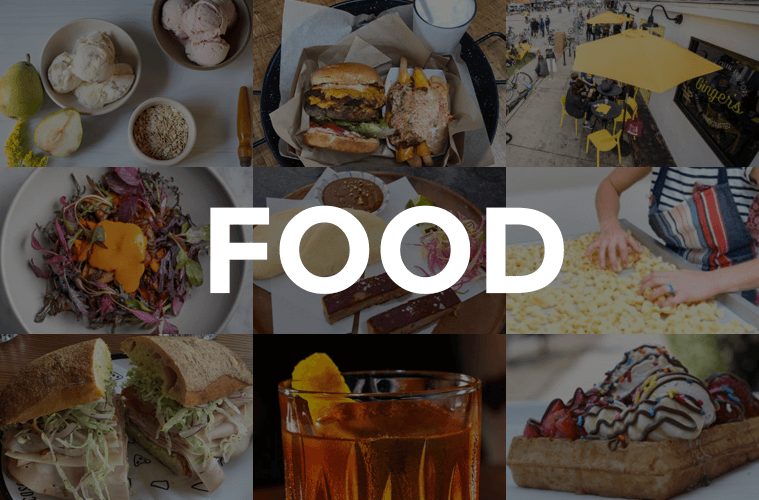Photo by Anne Fishbein
Two men walk into a bar. Or rather, 102 men walk into a bar, with room for maybe 50 of them, with its television perversely set to Animal Planet instead of the Lakers game, with an ambiance rather like alumni night at the Sigma house, but with better-looking women, better food and much, much better-tasting beer. Welcome to Father’s Office, where the tapas are pretty tasty, the microbrews are on tap and dining is a full-contact sport.
As regulars to the bar know, there are no reservations, no minors allowed and no menu substitutions permitted — if you would rather have your crostini of Spanish sobresada without queso manchego melted over the top, it is your responsibility to remove the offending cheese. There is also no line, no wait-list and nobody keeping track of seating, so if you want one of the few tables in the bar (and practically speaking, it is impossible to eat the bar’s food standing up), you will have to circle the room until somebody gets ready to leave, then plunge into a scrum with 10 other people who are just as hungry as you are. It is a tag-team match with no referees, and if you show up to Father’s Office during what might be considered a normal dining hour, you may come to believe that the chairs can fly.
“How do you get a table here?” asked a friend.
“Honey, this is Father’s Office,” the waitress said. “You’ve got to fight for it.”
In practice, what this means is that regulars, who presumably know at least a person or two already seated, tend to ease into tables occupied by friends or acquaintances, which in theory leads to a sort of genial publike conviviality. (The pay-as-you-go ordering system at Father’s Office — you scan a menu, stand at the end of the bar until somebody notices you, then trade your credit card for one of those numbered plastic things that they put on top of your car at the car wash — enables the loose clannishness.) What it also means is that the wait for non-regulars is often endless. The first time I went to Father’s Office, three friends and I waited two hours and 15 minutes for a table, huddled into a corner furnished with a single stool.
“I'm eight months pregnant,” a woman bleated at us. “My blood sugar is getting low. I need a seat.”
“If you're so pregnant, what the hell are you even doing in a bar?” asked my friend.
It was obviously time to go.
Somebody here, possibly the chef-proprietor Sang Yoon, obviously enjoys this — the bold-faced “F.O.” that serves as the bar’s logo may stand for more than just “Father’s Office.”
This is the point in the review where I am supposed to say that the cooking at Father’s Office is worth any kind of discomfort, that the tapas, a sort of greatest-hits parade composed of the sausages and cheeses of the great South Bay delicatessen La Espanola, are unsurpassed, that the thin shoestring fries and the feather-light sweet-potato fries are wonderful (they are), and that the hamburger, which has been called the best in Los Angeles so often that even people in Pittsburgh know about the bar, is terrific enough to offset Yoon’s exercise in social Darwinism. But you’ll have to determine your own threshold of pain.
Daniel Boulud, at his dB Bistro in New York, loads his famous $24 hamburger with things like foie gras, braised short ribs, Parmesan-glazed brioche and sun-dried tomatoes in order to amplify the sensations of a perfect hamburger, the rush of intensity, the spurt of hot meat juices, the interplay of sweet and acid and bitter, glorious char that makes the hamburger America’s emblematic dish. The luxury ingredients do the work of making the burger taste more like a burger, the way that Monet can use a pound and a half of expensive impasto to make his muddy ponds look more full of life, more pondlike, than any photograph of the same pond could possibly be.
Yoon’s signature burger, oddly enough, has almost the opposite effect. The ingredients are close to orthodox (or at least what passes for orthodox at places like the Counter or Hamburger Hamlet), but the dry-aged beef is cooked exceptionally rare, and the patties are loosely packed. The charred onions are cooked down to something approaching the sweetness of maple syrup, the smear of Gruyère and Maytag blue adds a wash of funky richness that would be unplaceable if you weren’t told what they were. The smokiness of bacon, chopped and suspended in a sort of tomato compote, is probably the dominant note, but instead of crunching discretely the way you might expect in a bacon cheeseburger, the compote is as liquid as a condiment, giving the sandwich a pervasive and unmistakably porcine tang. The burger is layered not onto a dense American bun, brown at the inner edges from a few seconds on a hot grill, but piled, wad of arugula and all, into a crisp, light, oval French roll. The basic sensation is of richness and gooeyness, a viscous substance of great mass suspended in a weightless loaf — like a highly flavored pâté sandwich, say, or an interesting Balkan specialty: practically anything but a hamburger.
In a way, Father's Office is a perfect analogue to Bush-era America, a closed, mean, inward-looking place where tyranny masquerades as freedom, cronyism is taken for granted, and the powers that be talk a lot about hamburgers but ultimately deliver pâté.
Father’s 0ffice, 1018 Montana Ave., Santa Monica; (310) 393-BEER, www.fathersoffice.com. Dinner Mon.–Wed. 5–10 p.m., Thurs. 5–11 p.m., Fri. 4–11 p.m., Sat. 3–11 p.m., Sun. 3–10 p.m. AE, MC, V. Beer and wine. Takeout. Street parking.
Advertising disclosure: We may receive compensation for some of the links in our stories. Thank you for supporting LA Weekly and our advertisers.

